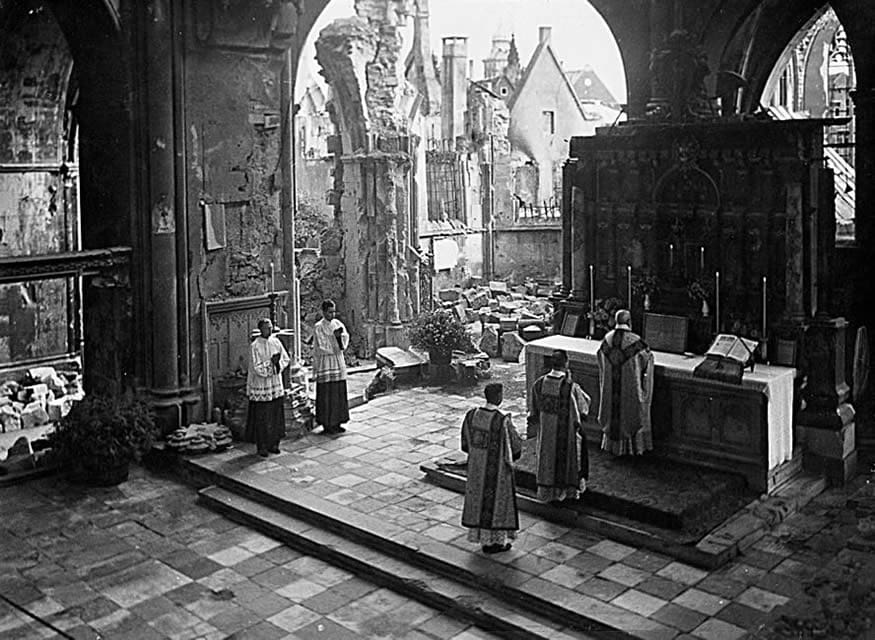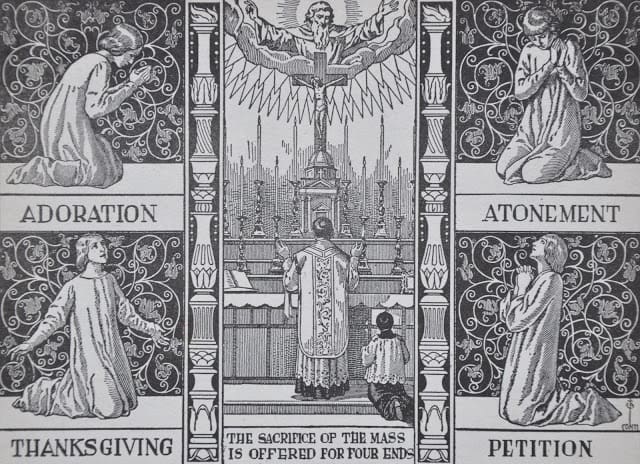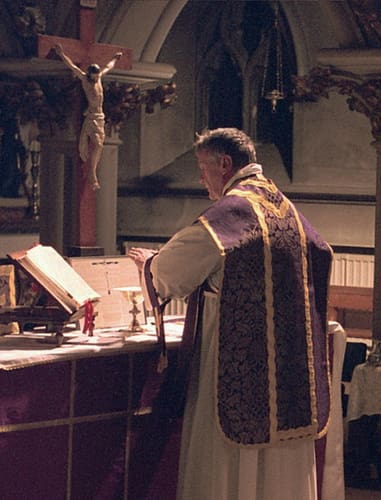[…] Today they’ve got a great article up on The Four Ends of Mass. […]
A blog for Catholic men that seeks to encourage virtue, the pursuit of holiness and the art of true masculinity.
The Four Ends of Mass

“It would be easier for the world to survive without the sun than to do without Holy Mass.” – St. Padre Pio
After a talk I gave a while ago, a young man came to me with a question. “I think I’m a good Catholic,” he began, “but I don’t go to mass. I hear it’s a sin not to go, but I don’t understand that. I guess I don’t see the point. Can you give me any reasons why I should go?” His question was sincere, and it led to a long and healthy discussion of why being present at the Holy Sacrifice of the Mass is important in the life of a faithful Catholic.
But truth be told, many Catholics probably ask the same questions, even if they attend mass faithfully. What’s the point? Why should I bother? This confusion and apathy about the source and summit of the Catholic faith is due to an almost complete failure of teaching on what the mass actually is.
To clear up some of this confusion, let’s examine the nature and purposes of the Holy Sacrifice of the Mass.
What is the mass?
Let’s begin with what the mass is not. The mass is not a community meal designed to strengthen our unity and “gather us in.” Feelings of unity and community can be strengthened at any number of events, including potlucks or Church picnics. At most, feeling unified with our brothers and sisters in Christ is a nice byproduct of the mass, but it is certainly not its chief end.
Second, the mass is not about you. It is not about having a wonderful “weekend experience,” as one new parish based program claims. Nor is its purpose to make you feel good about yourself, to encourage you, to inspire you, or to make you feel included and welcomed. You simply aren’t the audience—God is, and the mass is all about him.
So what is the mass essentially? It is first and foremost a sacrifice. In fact, it is the once for all sacrifice of Christ on Calvary, that transcends time and space, made present for us again in an unbloody manner. It is the perfect sacrifice that all the Old Testament sacrifices prefigured (See Malachi 1:11). In it, Jesus Christ lovingly offers himself in an act of oblation to God the Father on our behalf. He adores God the Father, he atones for our sins, he offers thanks and praise, and he intercedes for our needs.
As Catholics, we have the privilege of attending this sacrifice, and uniting ourselves to Christ’s self offering. Put another way, we can imitate Christ by offering ourselves, souls and bodies, to God the Father as “living sacrifices,” as St. Paul says. This is what participation in the mass really means. In the prayer Orate Frates, the priest acknowledges this participation of the faithful when he prays, “Pray brethren, that my sacrifice and yours may be acceptable to God, the Almighty Father.”
The Four Ends of Mass
 Now that we’ve discussed what the mass is, let’s briefly look at its four ends or purposes.
Now that we’ve discussed what the mass is, let’s briefly look at its four ends or purposes.
1. Adoration – The Holy Mass is first and foremost an act of loving adoration. It is worship of God our Father. Why? Because he deserves it. Almighty God is the most perfect of all Beings, the self-existing one, and all that exists owes its existence to him. He is the Supreme Good, the Good from which all other goods receive their meaning. He is the Supreme Beauty, the sole standard by which we can recognize and understand that which is beautiful. And he is Love itself, giving of himself from all eternity. He alone is worthy of our awe-struck adoration.
“Worthy art thou, our Lord and God, to receive glory and honor and power, for thou didst create all things,
and by thy will they existed and were created,” the saints and angels cry in the book of Revelation, and the mass is participation in this heavenly worship.
2. Thanksgiving – All that we are and have comes from God’s generous hand. Every good, every blessing finds its source in God alone, and our very existence is dependent on his will. In response to God’s endless generosity, which we often don’t even notice, thanksgiving is the only acceptable response. And guess what? True gratitude is one of the most joyful feelings we can have. “I would maintain that thanks are the highest form of thought,” said G.K. Chesterton, “and that gratitude is happiness doubled by wonder.” That is exactly what Holy Mass should be—an experience of happiness doubled by wonder.
3. Atonement – We are all sinners, and while we do our best to rationalize and minimize it, all sin is a grave offense against God, incurring his just wrath. But while we all deserve hell, we are not without hope. On the cross, Jesus Christ atoned for our sins totally and completely, and we have the assurance that if we turn to him in repentance and faith, we can find forgiveness and healing.
The sacrifice of Christ on the holy cross is our certain hope, and the Holy Mass is the re-presentation of this sacrifice. Therefore, the third end of the mass is atonement for our sins. The book of Revelation describes Christ appearing as a “Lamb as if it had been slain.” In heaven, Jesus stands before God’s throne, offering God the Father his once for all sacrifice in continual atonement for our sins and the sins of the whole world. This reality is made present at every mass.
4. Petition – The mass is a powerful form of prayer. In fact, it is the most powerful prayer the Church possesses. St. Jerome once said, “Without doubt, the Lord grants all favors which are asked of Him in Mass, provided they be fitting for us.” Many of the saints tell us that bringing our requests before Our Lord after the consecration is one of the most effective ways to obtain all that we need spiritually and physically. I would encourage you to pray in this way, knowing that Jesus is on the altar interceding for you as well.
Go to Mass
In every mass, Jesus Christs descends upon the altar in the fullness of his body, blood, soul, and Divinity. He is truly present, giving himself to us completely in the Holy Eucharist. It is truly the sacrifice of Calvary made present once again. What a beautiful and profound reality! As St. Padre Pio once said, “If we only knew how God regards this Sacrifice, we would risk our lives to be present at a single Mass.” Why would we miss mass for anything?
Don’t Miss a Thing
Subscribe to get email notifications of new posts and special offers PLUS a St. Joseph digital poster.
Related
COMMENTS
Reader Interactions
Comments
Trackbacks
-
-
[…] post The Four Ends of Mass appeared first on The Catholic […]
-
[…] does (though this couldn’t hurt!). But it does mean that you recognize that the Mass is a sacrifice of petition, adoration, reparation, and thanksgiving, and pray […]
-
[…] priest does (though this couldn’t hurt!). But it does mean that you recognize that the Mass is a sacrifice of petition, adoration, reparation, and thanksgiving, and pray […]
-
[…] The Four Ends of Mass — by Sam Guzman at catholicgentleman.com […]
-
[…] said he wished it of us. The “point” of the Mass isn’t community or inspiration. The four ends of the Mass are Adoration, Atonement, Thanksgiving, and Petition. We can look past the music and the homily and still give those four […]
-
[…] said he wished it of us. The “point” of the Mass isn’t community or inspiration. The four ends of the Mass are Adoration, Atonement, Thanksgiving, and Petition. We can look past the music and the homily and still give those four […]

At a Mass for volunteers for Eucharistic Congress, Jesus walked ahead of the priests, covered the gathering with a veil and cast out fishnets with glistening drops of water – it was wonderous, joyous and so full of blessings.
What is origin of the picture of a Mass being said in a ruined church?
This photo was taken in Mainz, Germany after the Allied bombing had ruined this church.
Thank you!
Thank you so much for posting this! All too often now, the new trend is to feel like the Mass is a social gathering meant to make us feel “fuzzy” inside and welcomed-going to see your friends at church, etc. …..but it is not. Let us all set an example and a tone of more reverence and silent awe and respect for what the Mass truly is—Jesus Christ truly present!
“This confusion and apathy about the source and summit of the Catholic faith is due to an almost complete failure of teaching on what the mass actually is.”
Never were truer words spoke or written. When Pope John XX111 opene the Second Vatica Council he expressed a desire that the faith be taught with ever greater clarity and without attenuation. This largely has not happened in the wake of the Second Vatican Council. When I was taking instructions to become a Catholic in 1958 the priest who was teaching me was doing it mostly from the Penny Catechism. He was very clear about the four ends for which the Holy Mass was offered and how I should strive to memorize the ordinary of it, which I did, and later to memorize most of it in Latin because I felt that it was important. In the wake of Vatican II at the time of the liturgical experimentation, which the late Pope Benedict described as “a time when anything goes”. I was so disedified and scandelized by what was taking place in the sanctuaries of some of our churches and passed off as Holy Mass, that I stopped going. A round fifteen years passed before I found a chapel where the traditional Latin Mass was stilled celebrated. I was moved to tears with a feeling of finding that which I thought I had lost forever. The attention and the devotion of the congregation was very apparent and they were not as one Bishop wrote to ” a gathering of people who were like onlooking dumb animals not comprehending what was going on”.
Why isn’t “Mass” capitalized in the article? I am noticing this slippage more and more. All the comments were able to make it a proper noun. It seems to make it pointless to address the importance of the Mass if you cannot even offer it as a proper noun…
I’m more interested why the pronouns referring to God are not.
Reverence. Reverence. Reverence. At any Mass where there is an abundance of reverence I believe the faithful gathered there are awed. I don’t wish to dwell on the lack of reverence at most churches but I believe the lack of reverence is one major reason we have roughly 20% of Catholics attending Mass on a regular basis. If we were awed at Mass, if we had more solemnity and less orchestrated “stuff” I believe the Mass would carry over for us more and more into our daily lives. I believe that reverence would cause us to shout from the mountain tops, to evangelize to those who choose to spend time on anything else other than the Mass. I ponder Padre Pio’s words and it causes me to appreciate the Mass all the more. I cannot fathom our lives without the Mass. At my Parish we dance around the subject of attendance at Mass and, I am afraid, we too have a sense of wanting to make it interesting with a big emphasis on Community. What I fail to understand is why would would consider anything other than the Eucharist. Nothing else matters. A miracle happens at every Mass and that alone should be enough for us to encourage others to be with us at Mass.
No wonder why the Mass is considered the Ultimate Prayer of the Church because in every prayer the four elements (Adoration, Thanksgiving, Atonement, and Petition) are also present though in a lesser degree. The Mass is the Prayer of Christ for the Bride!
Sometimes, the four elements are: Adoration, Contrition or Confession, Thanksgiving, Supplication (ACTS). I like the version here since the order is reasonable and thus must be done AThAP!
Thanks for the thoughts. Cheers!
This is somewhat a sensible statement,
enjoy the statement from Saint Pio
It is imperative to be at mass.,,
i find that it is sharing the Eucharist,
sharing the bread as a table sharing with Jesus, for when we are amongst others, in a outdoor service is also a sensible way of sharing the Eucharist,
sharing and reflecting, and sharing the word of God.
I do like the overall push of the article and the four ends are on target, but I think the first two “What the Mass is not” claims are a bit too exclusive.
I. “The mass is not a community meal designed to strengthen our unity”
The reality is that Jesus gave us the Holy Sacrifice of the Mass in the context of a communal meal so that it could be perpetuated eternally. Throughout salvation history, sacrifice has been in the context of a meal, just as the reconciliation of two parties, or the union of two parties has been. Additionally, to deny that Jesus gives us the Mass to bring about greater unity in His Body is strange and to suggest that “COMMUNION” is just a byproduct of the Mass is absurd. A sacrifice is incomplete without communion between the two parties.
II. “Second, the mass is not about you.”
While this is true, it ignores the reality that the Mass is about God and what God has done for us. The whole reason we have the Mass is because God desires our salvation so much that He sent His only Son to die and rise to make it possible. I think statements like the one above do good to shock us into attentive humility, but they also seem to portray God as a far removed being on a throne who deigns to show up to allow us to worship rather than the loving Father Jesus has revealed to us who runs to welcome us home and throws a party for us over and over and over again.
III. Also, I think the word Mass should always be capitalized as a simple act of devotion.
God bless.
My brother, I think your confusion comes from terms, rather than meaning. Communion does not refer to communion between the members of the Church, because as necessary this unity of the Body of Christ is, it does not require a Mass for the Body to be held together. From Mass comes our faith, but this faith leads us to be in constant concern of our brothers, by means of acts of charity. Mass gives us the strength to come out of the temple, and star uniting the Body of Christ. It means a byproduct because the community uniting must be built as soon as you step out of Mass, and Eucharist gives you the means.
Your second disagreement comes from not understanding HOW God is working towards our salvation. It does not require us, and it is, as you point it, an act of love for us. And that’s precisely why the Mass is not about us. In the Mass, you are watching the salvation history, from the Old Testament in the Liturgy of the Word, all the way until these promises made to the jews become a reality in our modern time, right in the Liturgy of the Eucharist. We are not required at all for the salvation process to be put in motion, and that’s why the first end of the Mass stated on this article is adoration. God is working, in the most perfect display of His almightiness and love, to grant us a way back to Him. He does it by Himself, in the altar. We actually state it in the beautiful Common Preface IV for the Eucharistic Prayer: “For, although you have no need of our praise, yet our thanksgiving is itself your gift, since our praises add nothing to your greatness but profit us for salvation, through Christ our Lord.”
Let us be open to the light of the Spirit, brother, and analyse words by their nature. I am absolutely on the same page as you, when you say Mass has to be capitalised at all times. It also needs our entire love.
The photo was taken in the Cathedral Saint Paul in Munster, Germany after the Allied bombing had ruined this most beautiful Cathedral. Greetings from Germany. From the diocese Munster where I live. And dear Sam thanks be to God for this really important text! God bless you and your family! Oremus pro invicem
I don’t propose “wallowing in emotionalism”,but I do wonder sometimes why most of us aren’t knocked off our legs during Communion.There is nothing we could ever do to merit,His Gift,His Love,yet it “appears” to be reduced to the “routine”. I know,it’s an internal as well as external relationship We are all working towards….I don’t understand and I continue to try to “remain calm” and place my trust in Him.
Sometimes I almost so breathing, or can’t breathe. Or I’m in tears, in awe of the Gift of the Body, Blood, Soul and Divinity of Jesus Christ.
Stop breathing, that is!
Cool. Totally